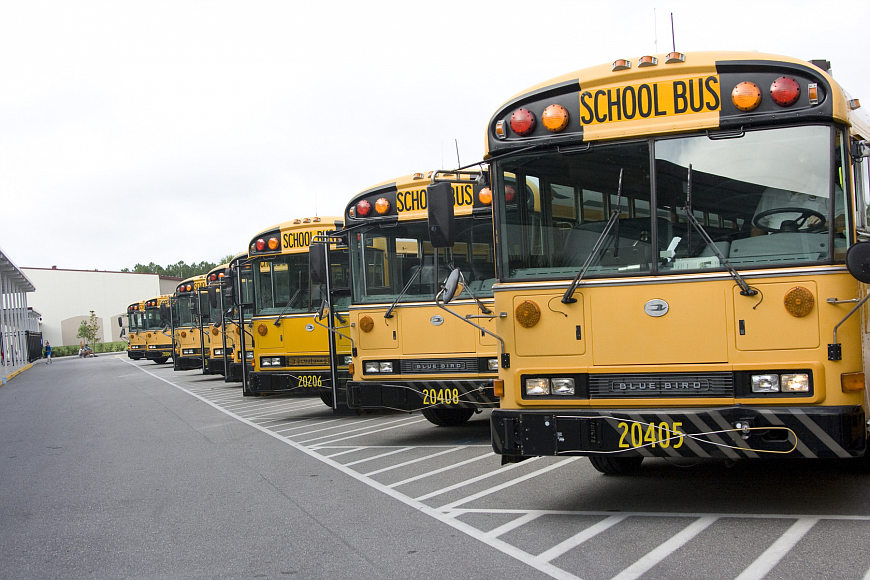- February 23, 2025

A group of city and School Board employees is trying to get children waiting for their school buses away from busy traffic in the mornings. They’re brainstorming possibilities: Creating larger areas for the kids to stand and wait away from the road, changing the location of stops to move them to less busy streets, and holding safety instruction for children are all possibilities.
The group held its first meeting Oct. 13, searching for ways to make local streets safer for kids after a 7-year-old Wadsworth Elementary student, Kymora Christian, died from a car strike as she waited for her school bus Oct. 7.
A few weeks later, on Nov. 2, a 13-year-old boy was struck while riding his bicycle home from school. The teen, who was hospitalized with non-life-threatening injuries, was the fourth child struck by a car since then beginning of the school year.
“The initial meeting, we did a lot of brainstorming and threw a lot of stuff out there,” Jason DeLorenzo, the group’s City Council representative, told council members at a Nov. 10 City Council meeting. “Then the staff, our staff and School District staff, were talking back and forth, put together a strategic plan.”
The plan is a draft at this point, Delorenzo said. The group most recently met Nov. 4 and hasn’t yet scheduled its next meeting.
For now, he said, the School District is working on the education aspect of the initiative, planning to deploy its Problem Solvers student teams to help educate students about street safety. The city is working on the engineering side of the problem, he said.
That might mean moving stops to city-owned land like pump station driveways where kids could wait away from the main roads, he said.
“One of the things the School District is looking for is to identify where there are a lot of kids at the stop, and maybe see if there’s opportunities to split them up into two smaller groups so there’s less congregating in one area,” he said.
Councilman Steve Nobile said there were two other issues residents had expressed concern about that he felt fell under the city’s purview: Speeding in school zones and cars passing school buses.
“I drive up and down Belle Terre every now and then during school times, and there are always cars speeding through the school zone while the light is flashing,” he said. “And the thing that irks me the most is that that person then pulls into the line to drop their kids off.”
DeLorenzo said he’d noticed problems too, near Indian Trails. But enforcement by the Sheriff’s Office has helped, he said. “They’re constantly running the bikes up there, and they have somebody in the median — it’s been good,” he said.
Nobile asked if the city could get more police presence. He sometimes passes St. Elizabeth Ann Seton Church when there’s a patrol car positioned there, he said, “and when you see that cop car and the flashing lights, everybody just slooooows down.”
As to the problem of cars illegally passing stopped school buses, DeLorenzo said, “The technology is there to have cameras on the buses. It’s an incredible capital expense.”
City Manager Jim Landon said other communities have cameras on school buses and issue citations. But after the red-lightcamera debacle, he said, such programs are unlikely to move to Florida unless the state legislature explicitly grants permission for cities to run such a program.
“I think it’s an excellent idea,” Netts said. “But then, I thought red light cameras were a great idea, too.”
Netts said he’s seen kids spilling out into the street at school bus stops, but “in the last two months, I’ve noticed that at the typical stops, there’s a parent there. One parent. ... kind of herding the kids back. The public — the parents, the grandparents, the older brothers and sisters — can take some responsibility. And I’ve seen a difference.”
Netts mentioned a program in another Florida city that sent citizen observer patrols out with radar guns to clock drivers in school zones. The observers got speeders’ plate numbers and sent them letters saying that they’d been seen speeding in a school zone, and that if they’d been clocked by a deputy, they would have received a ticket for it.
“It’s helpful that people know that someone’s watching,” he said. “When we had the red light camera signs up, people slowed down. When police cars start the flashing lights, people slow down.” And if people know one school bus has a camera, they may be less likely to pass any, he said.
“I’d suggest the public, council members, contact their representatives and suggest that school bus cameras make sense — even if you don’t do enforcement and you just send a nasty letter," Netts said.